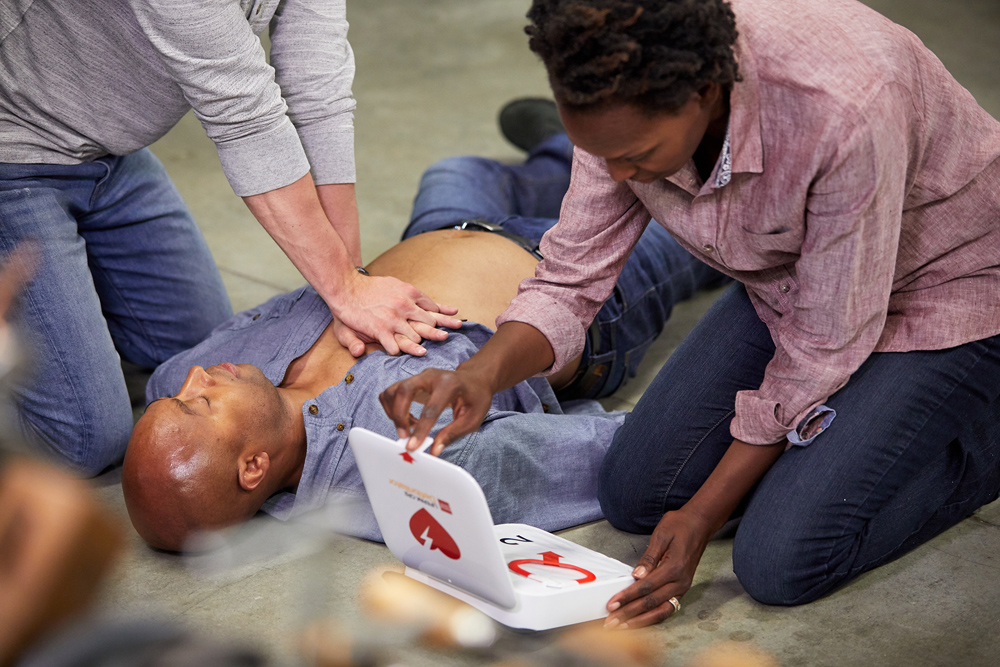It's wonderful summer weather! Festivals are in full swing, outdoor pools are open and the terraces are crowded. This summer, we are all getting outside in massive numbers. That also means we are more likely to see someone who becomes unwell. But what exactly do you do when someone goes into cardiac arrest?
An average of 300 Dutch people a week suffer a sudden cardiac arrest outside the hospital. The chance of survival in a cardiac arrest decreases by 10 percent every minute. With the right knowledge (trained civil aid workers) and resources (AED) on site, a victim has the greatest chance of survival when acted quickly. It is therefore enormously important to have an AED on standby nearby and as citizens to intervene and start CPR.
But how do you approach that?
Step 1: Ensure safety. Your safety always comes first. Before you do anything, check carefully to make sure the situation is safe for you and the victim.
Step 2: See if the victim is responsive: Gently shake the shoulders and ask (loudly): “Are you all right?”
Step 3a: If the victim DOES respond: Leave the victim in the position you find him in, provided there is no further danger. Try to find out what is going on and provide assistance, e.g. first aid, if necessary. Continue to monitor consciousness; the victim may still deteriorate.
Step 3b: If the victim is NOT responding: Ask a bystander to call an ambulance via 112 and ask to bring an AED, if available. If you are alone, call 112 yourself. Preferably put the phone on speaker so you can hear the dispatcher's instructions while your hands are free. Turn the victim on his back and open the airway: to do this, tilt the head back and lift the chin. Then check for breathing. “Check if the chest rises, listen at the level of mouth and nose if you hear breathing, and feel with your cheek if there is airflow.
If you notice irregular breathing, it may be agonal breathing, an impulse response of the body. The victim is breathing barely, irregularly or gasping for breath. There are breaths while no airflow can be felt. “A sign that you need to start CPR as soon as possible.”
Step 4: When providing CPR, alternate thirty chest compressions with two ventilations each time. “With the chest compressions you take over the pumping function of the heart. Sit on both knees at the level of the chest. Place the heel of your one hand on the center of the chest. Place your other hand on top of the first and interlock the fingers. Compress the chest at least 5 cm but no more than 6 cm. After each compression, let the chest rise up again. This may be done at a brisk pace of 100 to 120 times per minute or twice per second. After 30 chest compressions, you can give the victim the ventilations. Tilt the head back and lift the chin up. Pinch the nostrils tight and place your mouth over the victim's mouth. Exhale deeply once. Watch carefully to see if the chest rises. Ventilate one more time.
Step 5: Repeat the chest compressions and any ventilations until the victim awakes with certainty (eyes open and normal breathing), emergency services have arrived, or until you are exhausted. “Again your own safety must not be compromised.”
Has an AED device been brought? Then connect the electrodes to the victim's exposed chest. The device will provide it's own instructions. An AED will tell you to (cut) open the victim's clothing and where to place the electrodes. You can't do anything wrong. If the victim is shocked with an AED within 3 to 4 minutes, he or she has a 60 to 70 percent chance of survival. The AED will never deliver a shock if it is not necessary.”
We'll tell you more
Want more information about using an AED or want advice on purchasing one? Contact us or fill out the quote form and we'll get back to you.
Back to the overview